Discover The Ownership Economy
The Ownership Economy

The Ownership Economy
Author: The Ownership Economy
Subscribed: 14Played: 537Subscribe
Share
© The Ownership Economy
Description
Welcome to the Ownership Economy podcast, the podcast that explores the people and ideas that are utilizing technology, economics, and the law to reimagine how the economy can work for everyone. Here we connect with the entrepreneurs, investors, thought-leaders, academics, and politicians that are constructing a better economy, one based on broad-based ownership and democratic governance. Hosted by Martin Smith and Jahed Momand, two investors and operators that aim to use this platform to showcase the people and ideas that will shape more inclusive economies.
88 Episodes
Reverse
This week, Jahed Momand has an insightful conversation with Atticus LeBlanc, founder and CEO of PadSplit, a public benefit corporation that’s flipping the script on affordable housing.Atticus shares his personal journey from renting a room in Atlanta and navigating early entrepreneurial challenges to his "aha moment"—realizing the profound need for respectable, affordable housing for those often overlooked by traditional landlords. Discover how PadSplit challenges long-held assumptions in the rental market, such as arbitrary monthly rent payments, high deposits, and reliance on credit scores that often don't include rental history.Learn about PadSplit's innovative approach: offering all-inclusive, furnished private rooms with flexible, weekly payments aligned with residents' paydays. This model not only makes housing significantly more affordable and accessible for individuals earning below $50,000, including service workers and those on Social Security income, but also proves more profitable for property owners by fractionalizing space and reducing vacancy costs.Atticus explains how PadSplit focuses on resident management, handling payments and fostering community, thereby providing crucial stability and peace of mind for its members—many of whom are transitioning from homelessness or unstable living situations. Tune in to explore how reimagining basic housing assumptions can create immense opportunities for both renters seeking a new start and landlords looking to make a greater impact while achieving better returns.See Cliff Johnson from PadSplit speak to their model's viability and growth at the Ownership Economy Summit this year in NYC on October 7th. Grab your ticket here: https://www.ownershipeconomy.com/registrationuse the discount code OE2025VIP! for 40% off
This week we sit down with Allison Lingane, founder of Ownership Capital Lab, a nonprofit singularly focused on growing investment capital for employee ownership. Allison, with nearly 15 years in the employee ownership space, including co-founding Project Equity, shares her journey from creating scalable paths to opportunity through education to realizing the critical need for a robust capital market for shared ownership.This episode dives into how employee ownership, often considered the "best kept secret," can move beyond its current silos and into the mainstream. Allison discusses the core thesis of Project Equity—making employee ownership normal and self-generating—and how this led her to establish Ownership Capital Lab to specifically address the challenge of attracting capital. With a goal to inject an additional billion dollars of capital into the space, Allison explains the current landscape where dedicated employee ownership funds, totaling around 27-30 with $500 million in assets under management, are still largely "emerging managers".Listeners will gain insight into:The innovative approach of newer funds that attract mainstream business owners with acquisition offers rather than solely employee ownership proposals, making employee ownership competitive with private equity buyouts.The impressive 12-15% IRR return profiles of private credit employee ownership funds, which are designed to outperform mainstream private credit with lower default rates.The critical need for senior debt that can match the speed of private credit to ensure employee ownership funds can compete effectively.The importance of the proposed American Ownership and Resilience Act, which aims to provide specialized employee ownership funds with access to matching low-cost government capital, positioning employee ownership as a vital tool for retaining American commerce.Ownership Capital Lab's work in developing the first-ever roadmap for employee ownership capital growth and fostering connections and education among investors and funds.The pervasive misconception among institutional investors, like some foundation endowment committees, that companies opting for employee ownership are "duds," highlighting the ongoing need for broad education.Allison will be elaborating on these crucial topics for scaling employee ownership at a summit in New York on October 7th. Don't miss this insightful conversation on how to unlock the full potential of employee ownership through strategic capital investment and education. You can learn more about Allison's work at ownershipcapital.capital.Get your ticket to the summit to see Alison speak here: https://www.ownershipeconomy.com/registration
This week, Rene Reinsberg, co-founder and CEO of Celo and Self joins us. Rene's early journey was shaped by his small business owner parents, helping him establish an early entrepreneurial drive consistently focused on empowering individuals and "the small guy". This led to founding an early machine learning/AI company sold to GoDaddy that helped small businesses compete online.Rene's pivotal move into crypto in 2016-2017 stemmed from realizing Ethereum would enable programmable money and user-driven ownership. This vision inspired Celo, a protocol aiming to rewire economic systems using stablecoins, micropayments, and verifiable identity to foster positive-sum wealth for users, particularly in economies with high inflation. A key learning is Celo's unique approach to wealth creation and its strategic evolution through a governance-led decision to transition to an Ethereum Layer 2, enhancing economic efficiency, user adoption, and integrating with Ethereum's robust ecosystem.Finally, Rene introduces Self, his latest venture, empowering individuals with control over their data and privacy, breaking "walled gardens". Self addresses privacy-preserving identity by leveraging biometric passport chips and zero-knowledge proofs to verify unique humanness without revealing personal data. The transformative potential of privacy-preserving digital identity with Self is a crucial takeaway, offering solutions for civil resistance in airdrops, enhanced decentralized governance, and verifying real humans for AI search tools, including a recent integration with Google. This technology also offers a path toward universal basic access to compute by distinguishing humans from bots in the AI era.
This week, we welcome back Jason Wiener, founder of Jason Wiener PC, for an insightful episode on alternative ownership structures. Jason’s boutique law firm specializes in alternative ownership design, including co-ops, various forms of employee ownership, and non-extractive financing. He guides shared ownership-minded founders through the entire lifecycle:Starting: Jason champions "full spectrum ownership design," advising founders to prioritize their "why" and "what" (goals and desired outcomes) over a specific legal vehicle. He notes that starting as a traditional C-corp or LLC is not irreversible, but founders must understand trade-offs with venture funding. His firm offers a free, self-guided "Community Enterprise Legal Design Course" online for those committed to community-centric models and eschewing upfront venture capital.Growing: Jason emphasizes that success depends on human conduct, communication, and decision-making, not just legal documents, which serve as guardrails. Successful enterprises balance core values with clear business strategy and client focus.Financing: Given that alternative ownership models typically do not have traditional liquidity events, revenue-based financing (e.g., demand dividends, revenue sharing notes, self-redeeming preferred equity) has emerged as a popular mechanism, aligning investor repayment with the co-op's financial health. Resources like the Transform Finance directory and leveraging Program Related Investments (PRIs) and Mission Related Investments (MRIs) from foundations can provide capital.Exiting/Succession: This constitutes a significant portion of his firm's work, especially amidst the "silver tsunami" of retiring business owners. Jason stresses "succession readiness"—organizing books, tax returns, and creating a data room—as 97% of the work. The choice of conversion pathway is a technical assessment, not an ideological one.Jason will lead a hands-on workshop at the Ownership Economy Summit 2025 in New York on October 7th, offering a deeper dive into making these critical assessments for business succession. You can find more resources, including his blog and the free course, at jrwiener.com. And you can get your ticket to see him speak right here: https://www.ownershipeconomy.com/registration
In this episode of The Ownership Economy podcast, a discussion is held with Dr. Bill Castellano, Director of the Rutgers Institute for the Study of Employee Ownership and Profit Sharing. Dr. Castellano's extensive background, including over two decades on Wall Street in strategic HR management and his academic role, is explored, noting his early exposure to employee ownership through an ESOP and equity compensation.The empirical and scientific evidence supporting the value of employee ownership is a central theme. Benefits such as enhanced employee engagement, increased productivity, higher customer satisfaction, and improved business survivability, even during economic downturns, are discussed. The role of employee ownership in addressing wealth inequality and increasing retirement savings for a broad range of employees, including low-to-moderate income workers and people of color, is emphasized, often provided as an additional benefit.Various forms of employee ownership, including equity compensation, worker cooperatives, ESOPs, and Employee Ownership Trusts (EOTs), are differentiated. Significant tax incentives associated with ESOPs (e.g., 1042 capital gains relief for C-corps, federal tax exemption for S-corps) and EOTs are detailed.Despite these compelling benefits, barriers to widespread adoption are examined. These include a lack of awareness among business owners regarding employee ownership as a succession strategy, the perceived complexity of regulated programs, and difficulties in securing financing for these transactions. Policy initiatives, such as proposed bills for guaranteed loans, are presented as potential solutions. While significant growth has been observed in EOTs, it is noted that the overall percentage of the workforce participating in employee ownership programs has remained largely stagnant over 15 years.Finally, the intersection of employee ownership with the future of work and artificial intelligence is explored. Employee ownership is presented as a crucial model for navigating the transformation brought by AI and automation, fostering employee engagement and ensuring successful business adaptation rather than widespread job elimination. The institute's mission, including its research, conferences, and policy analysis, is highlighted, with resources available at ownership.edu.Get your ticket to this year's summit here: www.ownershipeconomy.com/registration
This week, we chat with Rowland Hobbes, Founder and CEO of Stake. Rowland, who will be speaking on the housing track at the upcoming Ownership Economy Summit 2025, offers insights into how to use modern fintech to accelerate renter wealth building and give more people upside in ownership through renting.In this episode, we cover:The pivotal moment Stake's strategy was shifted from offering renters equity to focusing on immediate cash back will be discussed. It will be revealed how direct feedback from renters indicated that for many, "it's the money, stupid"—implying that current financial relief for essentials like groceries, medicine, and childcare was considered far more critical than future equity. Initially, Stake had explored giving equity to renters, envisioning ownership through their residence, but this approach did not resonate with renters in market testing, partly due to a lack of trust that the equity would materialize and a desire for immediate utility.How an innovative, mutually beneficial business model was developed by Stake, encouraging landlords to fund cash back for renters, will be explained. Drawing inspiration from loyalty programs and the Costco membership model, it will be shown how properties can achieve better performance, with delinquencies reduced by 44% and renewal rates increased by 15%, through investing in their renters' financial well-being. This approach converts existing landlord spend, such as "one month free" offers, into cash back for renters, proving more effective than negative behavioral incentives like late fees.The broader vision for "tenant equity vehicles" and embedded financial services that empower renters beyond just paying rent will be presented. How renters are helped by Stake to build credit, save money, and access fair banking will be discovered, fostering a movement towards institutionalized financial savings for renters, akin to 401ks or 529s. The evolution of tenant equity vehicles, including profit sharing in the form of cash back, will be detailed, highlighting collaborations with entities like Enterprise Community Partners and government initiatives in Colorado.Invaluable lessons for anyone interested in mission-driven ventures, financial innovation, and addressing systemic wealth gaps are offered in this conversation.Rowland Hobbes will be speaking at the Ownership Economy Summit in New York on October 7th, 2025! Grab your ticket here, 20% listener discount is active until the end of August: https://www.ownershipeconomy.com/registration
This week, we welcome Ben Fielding, Founder and CEO at Gensyn. Gensyn is a proud sponsor of this year's summit.Ben recounts his journey from deep learning research to addressing the critical issue of compute resource monopolization in AI, leading Gensyn's pioneering decentralized approach. Ben explains how they're solving the fundamental problem of trust in distributed compute networks, a challenge that even past volunteer computing efforts like SETI@home struggled with due to incentives. Their key innovation, Verde, is a robust verification system ensuring the reliability of machine learning computations across untrusted nodes.Learn about Gensyn's vision for open protocols in machine learning, drawing inspiration from the internet's early days to foster broad participation and emergent AI capabilities. Ben discusses their work on horizontal scaling, including RL Swarm and its new backend, GenRL, aiming to create a "MapReduce moment" for AI that leverages global compute power.Ben Fielding will be speaking live at the Ownership Economy Summit in New York on October 7th, 2025.Gensyn on the webBen Fielding on TwitterGet your summit tickets here at the lowest price — prices go up 7/31!Link to tickets: https://www.ownershipeconomy.com/registration
In Episode 081 of The Ownership Economy Podcast, we welcome John Abrams, pioneering founder of South Mountain Company, a 40-person architecture and building worker co-op. John shares his journey from inadvertently starting his business in 1973 to converting it into a worker co-op in 1987, where every member-owner has one share and one vote after a unique 5-year tenure. He discusses how this model offers a positive succession story for founders, how this contrasts with traditional business exits that often leave founders with broken hearts, and employees feeling let down. John also breaks down the main approaches—Worker Co-ops, ESOPs, and Employee Ownership Trusts (EOTs)—and advises founders to start now in their transition planning. John Abrams will be sharing his invaluable expertise and case studies at the Ownership Economy Summit on October 7th in New York, for founders looking to build cooperatives or shared ownership enterprises. Grab your tickets to the summit here at the lowest price before they go on 7/31:https://www.ownershipeconomy.com/registration
Is Crypto Finally Becoming... "Boring"? A Deep Dive into Mainstream Adoption with Coin Fund's DavidJoin us for a captivating conversation with David, Managing Partner and Head of Investments at Coin Fund, as he shares his unique journey from Venrock and consumer internet startups to the forefront of the crypto space. With nearly a decade in the industry, David believes we're on the cusp of a "boring moment" for crypto – and that's a good thing!In this episode, we unpack:The "Road to Boring": Discover why the widespread adoption of stablecoins is the key indicator of crypto's maturity, enabling the movement of fiat-like money on blockchain rails at incredibly low costs.Legislative Catalysts: Learn about the pending US legislation, including the Genius Act and the Market Structure bill, that could unlock massive institutional adoption and dramatically increase stablecoin market cap and transaction volumes, potentially reaching over $1 trillion and $100 trillion respectively.Unlocking New Behaviors: Explore how a "pay" button in every app, 24/7 global payments at fractions of a penny, and yield-bearing stablecoins will transform personal finance, payroll, and business operations. David discusses how these innovations stand to disrupt traditional financial services like remittances and even fundamentally reshape banking's net interest margin.The "On-Chain" Movement: Understand what it means to be "on-chain" and how the combination of stablecoin usage and strong demand for digital assets like Bitcoin and Ethereum is accelerating the movement of wealth onto blockchain networks.DeFi 3.0 & Real World Assets: Get insights into the next evolution of decentralized finance, including the explosive growth in staking, perpetuals, and the tokenization of Real World Assets (RWAs) like private credit and potentially even equities, leading to 24/7 global trading.The Future of Digital Collectibles: David provides his outlook on NFTs, distinguishing between the past "picture-based" boom and the current, more practical uses of NFT technology in areas like AAA gaming and "IP on-chain".David also highlights the immense opportunities for founders to build the next generation of decentralized financial products, including privacy-protecting payment solutions. Prepare to hear why a small community of developers has built infrastructure poised for adoption by giants like Amazon and JP Morgan, signaling a catalytic moment for the entire crypto ecosystem.Tune in to understand why crypto's journey to becoming "boring" means it's more exciting and impactful than ever before.
Building a purpose-driven business isn't for the faint of heart. In this episode, Christian Kroll, founder of Ecosia, provides a candid account of the challenges he faced in transforming his company into a steward-owned entity. We'll hear about the unexpected legal hurdles he encountered in Germany, the complexities of finding a structure that balanced impact with operational flexibility, and the surprising moment when an early investor, Tim, honored a verbal agreement despite the potential for a massive windfall. Christian's story reveals the real-world complexities of prioritizing purpose over profit and offers valuable insights for any entrepreneur seeking to build a company that's truly committed to social and environmental good.
Get your ticket to see Christian speak live at the Ownership Economy Summit, December 4th 2024 in NYC: https://www.eventbrite.com/e/2nd-annual-ownership-economy-summit-registration-920820347447
use the code EXCLUSIVE30 for 30% off, just for podcast listeners.
What if there was a better way to do business — one that prioritizes people and planet while delivering profits? Join us as we talk to Julie Menter, Program Director at Transform Finance, about alternative ownership enterprises (AOEs). Julie breaks down complex concepts like ESOPs, worker cooperatives, and golden shares with real-world examples like New Belgium Brewing and Tony’s Chocolonely. We’ll explore the benefits of AOEs, how they address societal challenges, and what role investors can play in supporting this growing movement.
Get your ticket to see Julie live in New York at the Ownership Economy Summit at 101 Park Ave: https://www.eventbrite.com/e/2nd-annual-ownership-economy-summit-registration-920820347447
use the code EXCLUSIVE30 for 30% off, only for podcast listeners.
In 2008, Juho Makkonen and his co-founder built what was essentially Facebook Marketplace before
Facebook Marketplace. Their student-focused platform at Aalto University in Helsinki quickly morphed into ShareTribe, a company that empowers entrepreneurs to create their own online marketplaces. ShareTribe offers a powerful yet user-friendly software solution that allows entrepreneurs to launch marketplaces without coding and provides no-code customization options for more complex needs. They even have a network of developers to help with advanced customization.
But ShareTribe's journey wasn't without its challenges. Early on,
Juho and his team realized the misalignment between traditional venture capital and their purpose-driven mission. In 2018, they made the bold decision to transition to a steward ownership structure, buying out their investors and raising €1.1 million through crowdfunding. This shift ensured ShareTribe remained true to its values of sustainability and impact, prioritizing the needs of its customers and employees over
hypergrowth. Tune in to hear Juho's story and learn about the challenges and rewards of building a purpose-driven, sustainable business in tech.
Juho will also be speaking at the Ownership Economy Summit next week, December 4th, 2024 in New York. Get your ticket now, with a 30% discount for listeners (use EXCLUSIVE30 at checkout).
https://www.eventbrite.com/e/2nd-annual-ownership-economy-summit-registration-920820347447
Nathan Schneider returns to the Ownership Economy Podcast to discuss strategies for building a more equitable economy through shared ownership. He argues that we need to create new "destinations" for cooperative businesses to thrive. While there's a lot of energy focused on supporting co-ops in their early stages, he believes we need to think more strategically about how to enable these businesses to achieve significant scale.Drawing on examples like the Rural Electrification Act and Employee Stock Ownership Plans (ESOPs), Nathan highlights how targeted policy changes can help unlock the potential of shared ownership. He points out that the current venture capital model, focused on rapid growth and exits, often leaves shared ownership ventures behind. To counter this, Nathan calls for new financial structures and policy frameworks that align with the goals of shared ownership and prioritize long-term sustainability and community well-being.This conversation is a must-listen for anyone interested in the future of work, economic justice, and building a more equitable economy.
Can you build wealth without owning a home? Dr. Michael
Barnes, founder of Viva Benefits, believes you can. In this episode, we trace Michael's journey from teaching in under-resourced communities to starting a tech company that's tackling the housing crisis head-on. Discover how Viva Benefits is providing renters with access to financial tools, benefits, and even cash back on rent, all while improving the economics of multifamily properties. This is a must-listen for anyone interested in social impact, entrepreneurship, and the future of housing.
Mike will be joining us as a speaker at this year's Ownership Economy Summit as well - grab your ticket below, use the code EXCLUSIVE20 to get 20% off, just for podcast subscribers: https://www.eventbrite.com/e/2nd-annual-ownership-economy-summit-registration-920820347447
In this episode, we sit down with Adam Silver, CEO and co-founder of Plural, a company that's revolutionizing the way we invest in renewable energy. Adam explains how Plural is using blockchain technology to make these investments more accessible and efficient, allowing anyone to own a piece of the clean energy future. We explore the benefits and challenges of this innovative approach, and Adam gives us a sneak peek at an exciting project involving Bitcoin mining and solar energy. Plus, we get a preview of what he'll be discussing at the upcoming Ownership Economy Summit. Join us as we explore the future of renewable energy finance with Adam Silver.
In this episode of the Ownership Economy, we're joined by SEC Commissioner Hester Peirce, who dives into crypto regulation in the EU vs. the US, how she is thinking about regulation for entrepreneurs building in crypto, and what 2024 might bring. Note: This episode was recorded in January 2024.
How do the worlds of cryptography, privacy, and AI relate? What is the promise of NFTs for building a user- and creator-owned economy? We dive into these topics and more with Ownership Economy Summit speaker David Pakman. David started his career in tech at Apple, and has been in venture capital for 20+ years at prominent funds Venrock and Coinfund, and was among the first VCs to realize what was coming in crypto and moved in early to back teams such as Dapper Labs, 3Box (Ceramic Network), and Rarible. David has been on the bleeding edge of the thinking in this space concerning user ownership of data, creator ownership and IP, and the building of an ownership economy.
Over the last 120 hours, a governance crisis the likes of which we may never see repeated happened at world-leading artificial intelligence company OpenAI, culminating in the firing (and rehiring!) of Sam Altman, with a tectonic shift in their governance in the space of a few days. In this episode we explore what led to this situation, how it could have been simulated ahead of time, and what you should do with your governance design if you’re thinking of starting a world-changing technology company, to ensure maximal flexibility and make governance an asset and not a liability.
Joining us for this episode are Dr. Michael Zargham, board member and PI at the Metagovernance Project, and Amber Case, entrepreneur, author, and founder of Superset, DAODAO, and other ventures. Both guests are principal investigators at the Metagovernance Project, a nonprofit foundation focused on building open-source tooling and protocols for a governance layer around the internet.
In episode 069, Jahed sits down with Dr. Astrid Scholz, ecological economist and social entrepreneur, to discuss how her career arc has cut across governance and ownership, and the resulting innovations she and her teams have delivered. Along the way, we cover ecological economics and how it values ecosystems and people in addition to profits, why the current org structures were not a fit for her and how she and her co-founders innovated on the Zebras Unite Co-op, and the innovation they’ve spurred to deliver more capital to social enterprises at every level, from idea to seed to Series A and beyond. It’s a valuable episode for any entrepreneur considering how to start a new venture outside of the traditional VC model.
In this episode of the Ownership Economy, Martin and Jahed connect with Anthony Cimino Head of Policy at Carta. The conversation discusses challenges and opportunities in the US policy arena to advance broad-based ownership. Anthony walks us through the history of current rules on the books at the SEC and IRS, why they need updating for the world today, and how his past as an operator in Washington, D.C. informs his current work and approach. Investors, start-up founders, and policy workers will all enjoy this episode.



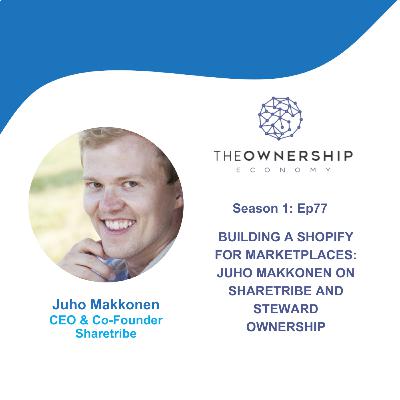
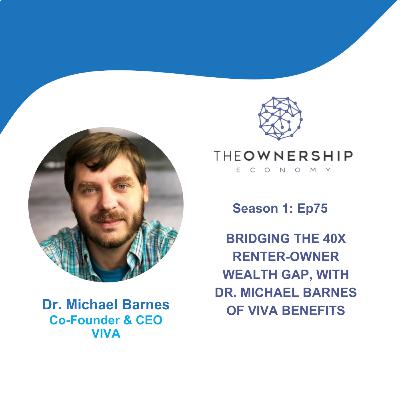
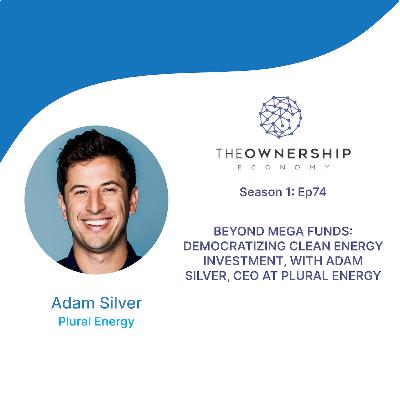
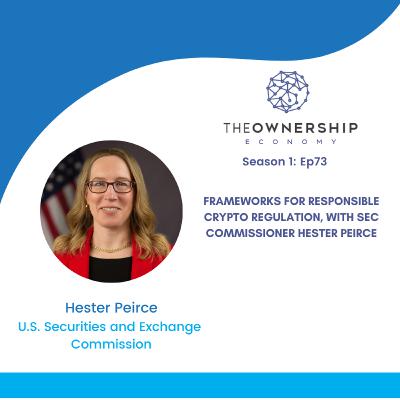

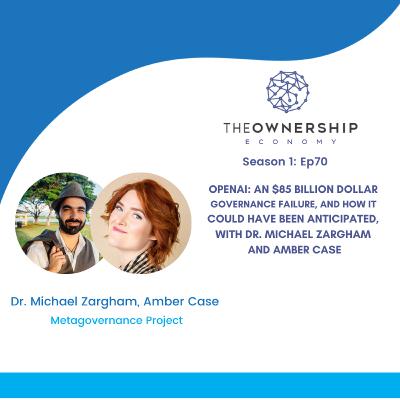

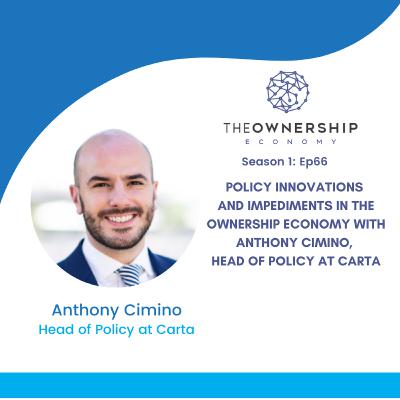



Great podcast, brilliant insights from Julia, thank you.